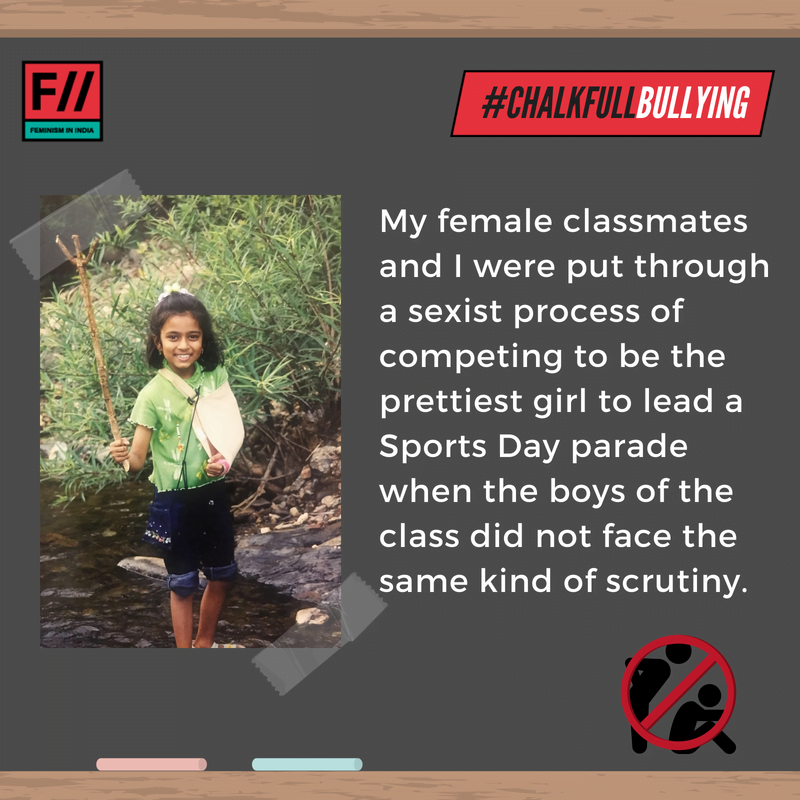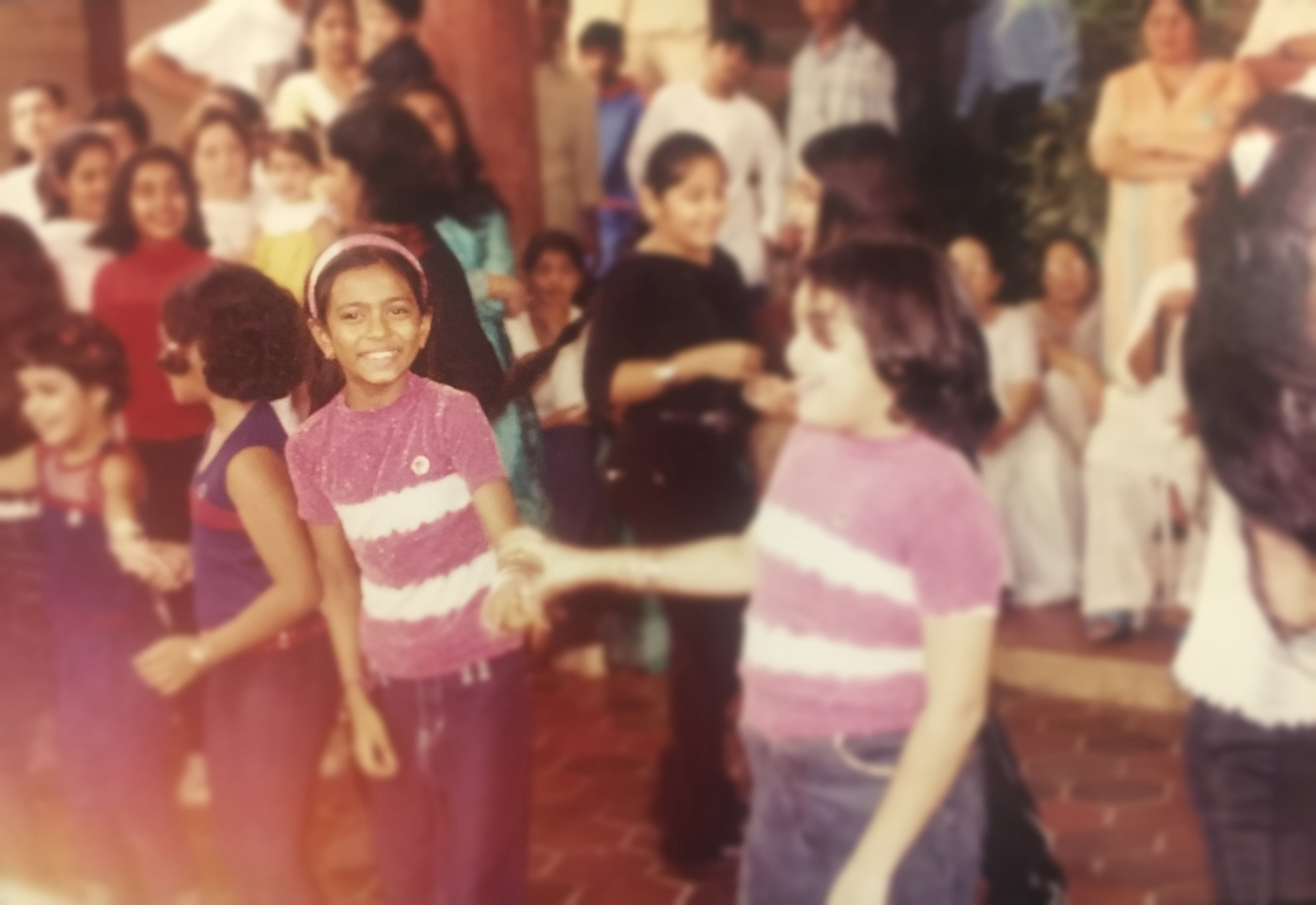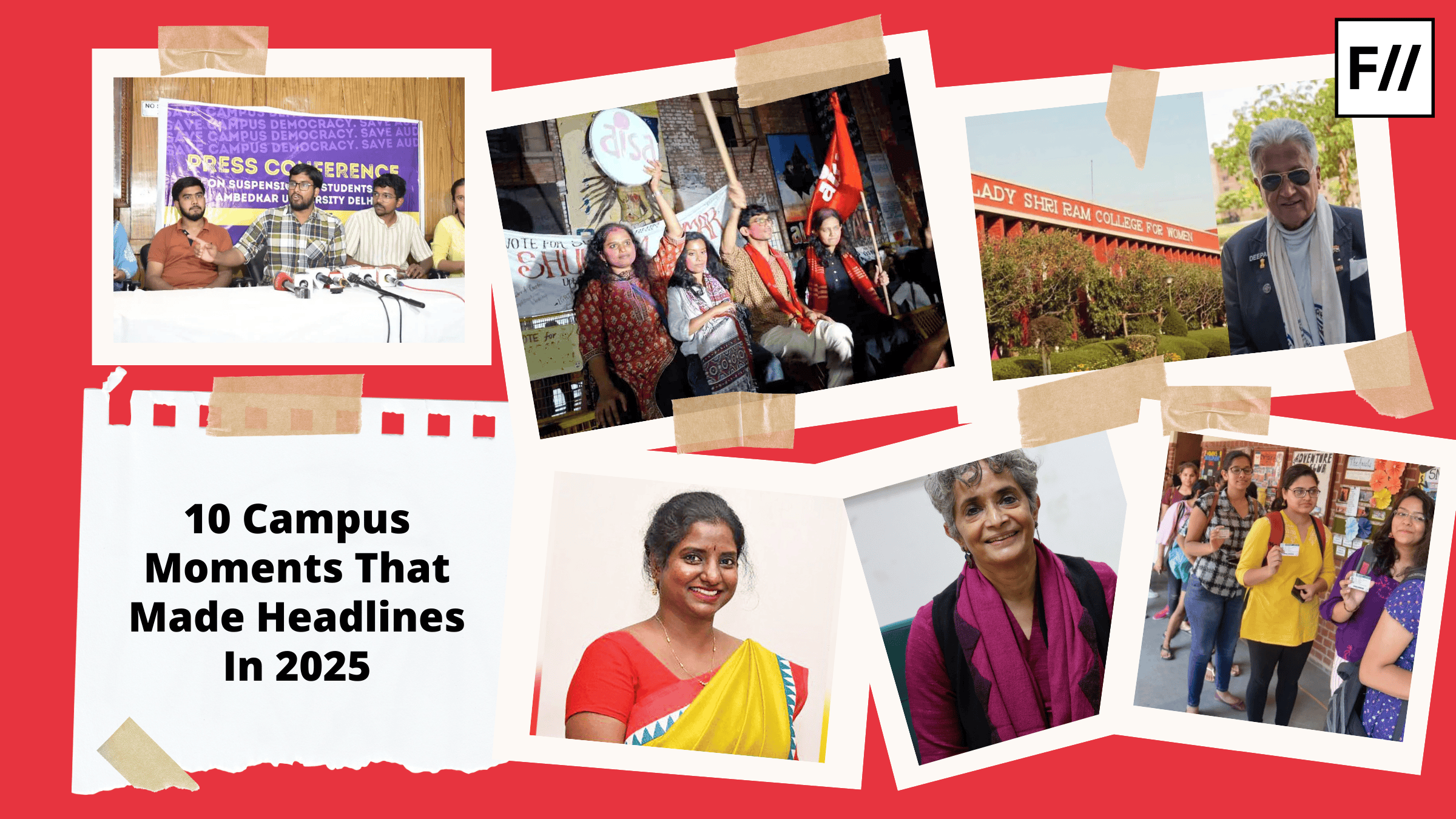Editor’s Note: #ChalkfullBullying is a campaign that resolves to tell stories about gender-based bullying that happens in school, where students, especially non-binary and girl students, are subject to harassment, moral policing, severe disciplining and punishment, and routine bullying. Their fault being: for not conforming to outdated gender stereotypes, the repercussions for which can scar us for a lifetime.
I used to have a sash in the box of trinkets saved from my childhood. The kind that is presented to beauty queens. It was made of purple satin, with the words “MISS WORLD” hand-painted on it. My mother told me it was from my sports day in nursery, where the three most beautiful girls from my batch were selected to lead the parade.
But I have no recollection of that parade, of wearing that sash or ever being one of the prettiest girls in my class. Once my eczema flared up when I was a child, my skin colour changed drastically. My skin turned into a totally different, darker shade from the skin tone I was born with. My neck and elbows were crusty and always itchy.
The teachers would find my non-contagious plight repulsive and send me home and tell my mother not to send me to school if I was sick. After hundreds of appointments with dozens of doctors, my eczema was cured by the time I reached second grade. But my skin colour didn’t go back to what it used to be. Neither did I ever get another sash for my beauty.

My female classmates and I were put through a sexist process of competing to be the prettiest girl to lead a sport’s day parade when the boys of the class did not face the same kind of scrutiny. But I was also served standards of beauty that came with a massive portion of post-colonial colourism. My skin colour affected my self-esteem when I was bullied on the playground or taunted by overbearing family members, but it was also a deciding factor for the opportunities that were open to me in school.
Every year, the Annual Day came around and I wanted to participate. Every year, I would earnestly look at the teacher; with my fingers crossed behind my back, who made her rounds in each division, choosing the girls she thought were most fit. Every year, I would not be picked. Not even for an audition.
Every year, the girl with the fairest skin, longest hair or lightest eyes would get the lead female role. I didn’t understand why, at that point. I used to attend speech and drama lessons after school twice a week and even performed at Mumbai’s Prithvi Theatre one summer. So it definitely wasn’t a talent or ability problem, I remember thinking to myself. It was just so unfair.
Also Read: Somehow, My Dark Skin Determines My Entire Value As A Person
It was also unfair that I was always put in the corner for any group singing performance. My mother recognized my talent in singing when, like every Indian kid, I was asked to sing a song for guests at dinner. So she put me in after-school singing lessons.
I would perform at competitions around the city and sing the national anthem at my building’s flag hoisting every Independence Day. At school, I never got any solo performances. If I made the cut for a group performance that didn’t require a height-order-wise arrangement, I was always standing on the sides. It was as if my teachers tried to keep me in the shadows, where I would blend in and stay invisible.
I also remember going home in tears one year when almost every classmate of mine was, at some point, at least made the class monitor, but I was overlooked for leadership positions. I could feel that the teachers never expected me to be good at any activity or even academics. If I happened to excel at either, I can still remember the surprise that always followed. It was never vocalised, but I could tell, just like how I was told I was pretty for a dark-skinned girl, I had exceeded their expectations for a dark-skinned girl.
Every year, the girl with the fairest skin, longest hair or lightest eyes would get the lead female role.
I used to hold on to that satin sash as a reminder of my “lost” beauty. But once I realized that the sash was actually the symbol of how I went from a pretty girl to a dark-skinned girl and that it was a representation of how my skin colour defined my academic journey, I decided to get rid of it.
My early school years were basically a series of events where I was pushed in the dark because of my skin colour. Had I received a fair chance to perform on stage, maybe I would be pursuing a career in acting or theatre today.
Had my teachers not reacted with surprise at my academic prowess, I would probably not surprise myself when I excel at something today. The only way to know is if I go back in time and go through school with teachers not defining my path, or making choices for me because I was a dark-skinned girl in a world where girls are expected to be fair and lovely.
Also Read: My School Was A Breeding Ground For Humiliation | #ChalkfullBullying
If you (or anyone you know) have a story to tell about the gender-based bullying you encountered in school, please email us at info@feminisminindia.com (or on our Twitter, Facebook and Instagram page) and help us continue a conversation on bullying by those in power in schools. Anonymity is ensured.
About the author(s)
Ruchika Agarwal is a writer and video producer interested in starting the conversation about gender issues among teenagers and college students. She enjoys politically correct humour and breaking down the misogyny in movies and music.




